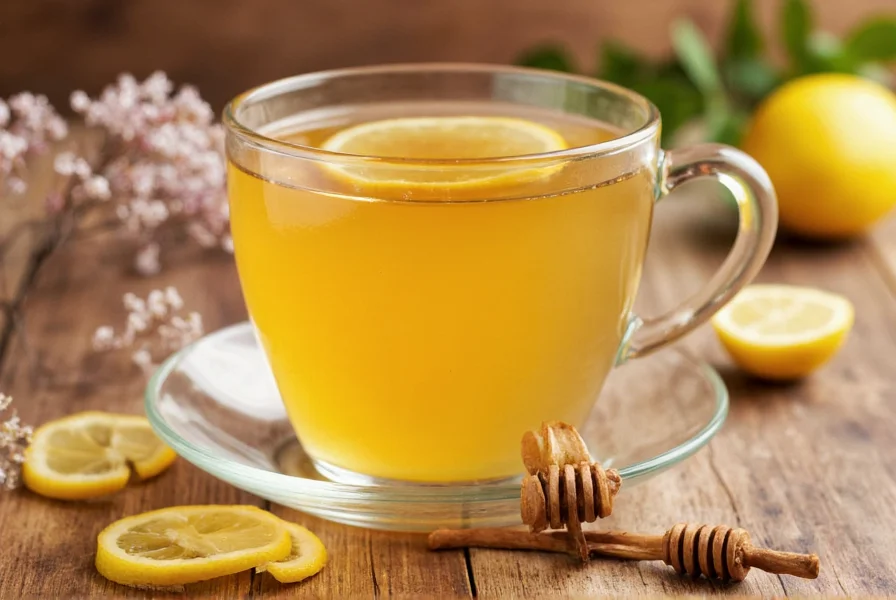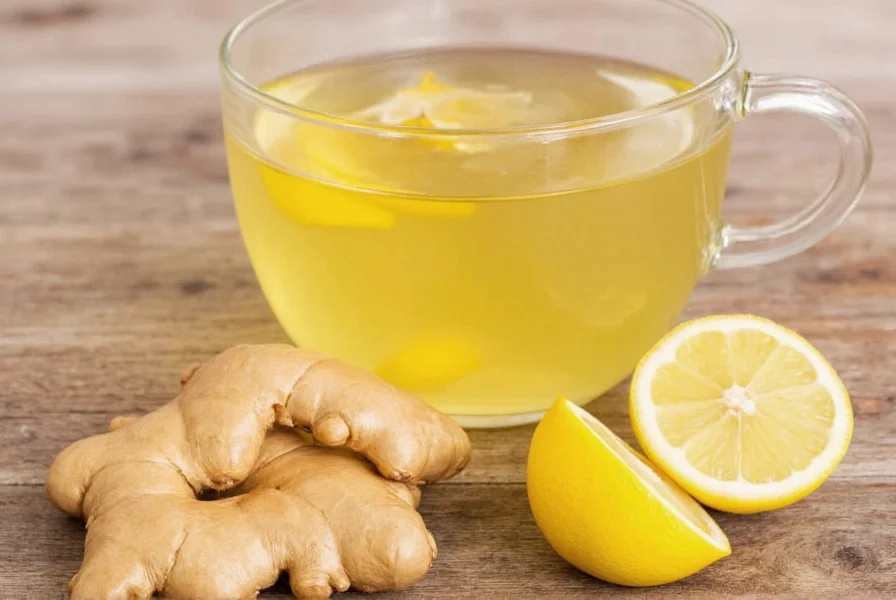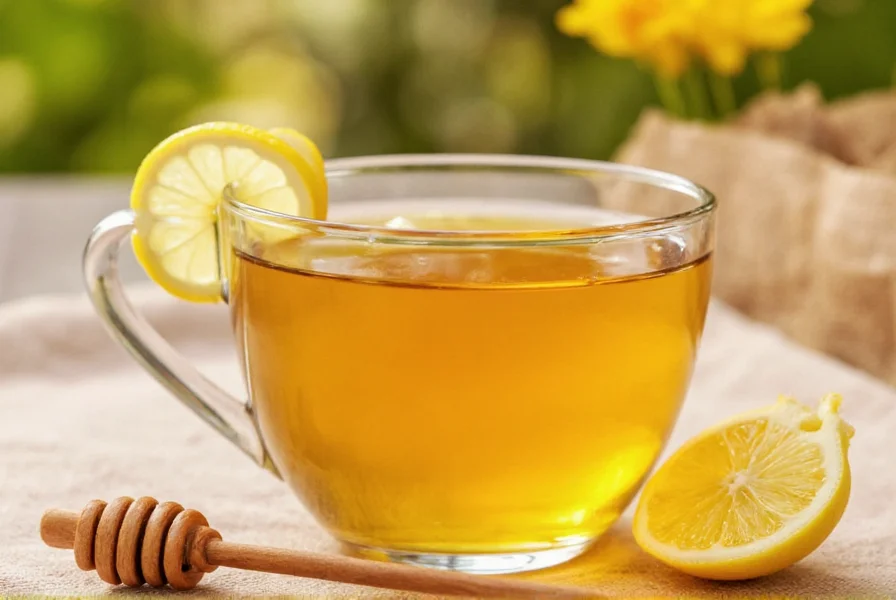Ginger honey lemon tea has been used for centuries across multiple cultures as a go-to remedy for common ailments. Modern research validates many of these traditional uses, particularly for respiratory and digestive issues. This article examines the science behind this simple yet powerful beverage, providing evidence-based preparation methods and realistic expectations for its effectiveness.
The Science-Backed Benefits of Ginger Honey Lemon Tea
Multiple studies confirm specific health benefits of ginger honey lemon tea's individual components and their synergistic effects. Ginger contains gingerol, a bioactive compound with proven anti-inflammatory and antioxidant properties. A 2019 review in Nutrients found ginger significantly reduces nausea and vomiting while improving gastrointestinal motility. Honey, particularly raw varieties, demonstrates antimicrobial activity against common pathogens and has been shown in multiple studies to reduce cough frequency and severity better than placebo. Lemon contributes vitamin C and flavonoids that support immune function.
When combined, these ingredients create a beverage with particular effectiveness for:
- Soothing sore throats (honey's demulcent properties coat irritated tissues)
- Reducing cough frequency (honey's effect on the vagus nerve)
- Aiding digestion (ginger's stimulation of gastric motility)
- Providing hydration during illness
- Delivering antioxidants that support immune function
| Tea Variation | Best For | Key Modification | Scientific Support Level |
|---|---|---|---|
| Standard Recipe | General wellness, mild symptoms | Equal parts ginger, honey, lemon | Strong evidence for symptom relief |
| Extra Ginger Version | Nausea, digestive issues | Double ginger amount | Strong evidence for GI benefits |
| Extra Honey Version | Severe cough, sore throat | Increased honey ratio | Moderate evidence for cough relief |
| Lemon-Forward Version | Immune support, vitamin C boost | Additional lemon juice | Limited evidence for cold prevention |
How to Make Ginger Honey Lemon Tea: The Evidence-Based Recipe
Creating effective ginger honey lemon tea requires attention to preparation details that maximize therapeutic benefits. The following method incorporates research on optimal extraction of active compounds:
- Peel and thinly slice 1-2 inches of fresh ginger root (about 30g)
- Bring 8-12 ounces of filtered water to a rolling boil
- Add ginger slices and simmer covered for 10-15 minutes (longer for stronger anti-nausea effects)
- Remove from heat and add 1-2 tablespoons of raw honey (never add honey to boiling water as it destroys beneficial enzymes)
- Squeeze half a fresh lemon (about 1-2 tablespoons juice)
- Stir well and strain if desired
This ginger honey lemon tea recipe for cold relief works best when consumed while symptoms are mild. For sore throat relief, drink while warm but not hot to maximize honey's soothing properties. The ideal timing for ginger honey lemon tea is 2-3 times daily when experiencing symptoms, or as a preventive measure during cold season.

What Research Actually Shows About Ginger Honey Lemon Tea
While traditional use abounds, scientific evidence supports specific applications of ginger honey lemon tea:
A 2020 study in Complementary Therapies in Medicine found ginger significantly reduced sore throat severity when used as part of a comprehensive treatment approach. Research published in JAMA Pediatrics demonstrated honey's superiority over placebo for nighttime cough reduction in children over age 1. The Cochrane Database review concluded that honey probably reduces cough frequency and improves sleep quality better than no treatment or antihistamines.
However, important limitations exist. Ginger honey lemon tea for sore throat works best as a complementary treatment, not a replacement for medical care in severe cases. The beverage shows minimal evidence for preventing colds, though it may reduce symptom duration. Claims about "boosting immunity" significantly are overstated - the tea supports general wellness but doesn't dramatically alter immune function.
When to Use Ginger Honey Lemon Tea and When to Seek Medical Help
Ginger honey lemon tea serves as an excellent home remedy for:
- Mild sore throats lasting less than 3 days
- Occasional digestive discomfort
- Mild coughs associated with upper respiratory infections
- General wellness maintenance
Consult a healthcare provider if you experience:
- Sore throat lasting more than 5 days
- Difficulty swallowing or breathing
- High fever (over 101°F/38.3°C)
- Blood in phlegm
- Severe abdominal pain
Certain individuals should avoid ginger honey lemon tea. Infants under 12 months should never consume honey due to botulism risk. People with ginger allergies or those taking blood thinners should consult their doctor before regular consumption. Those with gastroesophageal reflux disease (GERD) may find lemon exacerbates symptoms.

Maximizing the Benefits of Your Ginger Honey Lemon Tea
To get the most therapeutic value from your ginger honey lemon tea:
- Use fresh, organic ingredients when possible
- Allow ginger to steep sufficiently (10-15 minutes) to extract active compounds
- Add honey after removing from heat to preserve beneficial enzymes
- Consume while warm but not scalding hot
- Drink consistently throughout the day when treating symptoms
- Combine with adequate rest and hydration
When prepared correctly, ginger honey lemon tea for cold and sore throat provides measurable symptom relief without the side effects of many over-the-counter medications. It represents an excellent example of how traditional remedies can complement modern healthcare approaches when used appropriately.
Does ginger honey lemon tea really work for sore throats?
Yes, research shows ginger honey lemon tea provides significant sore throat relief. The honey coats irritated tissues, ginger reduces inflammation, and lemon provides soothing acidity. A 2020 study found ginger significantly reduced sore throat severity, while multiple studies confirm honey's effectiveness for throat pain. For best results, drink the tea warm (not hot) 2-3 times daily while symptoms persist.
How often should I drink ginger honey lemon tea when sick?
When treating cold or flu symptoms, drink ginger honey lemon tea 2-3 times daily. For sore throat relief, consume the tea whenever discomfort occurs, as the honey provides immediate soothing effects. Continue for 3-5 days or until symptoms significantly improve. Do not exceed 4 cups daily as excessive ginger may cause digestive upset in sensitive individuals.
Can I make ginger honey lemon tea without honey?
Yes, you can make ginger lemon tea without honey, but you'll miss key therapeutic benefits. Honey provides unique antimicrobial properties and cough-suppressing effects that lemon and ginger alone don't offer. For those avoiding honey (including parents making tea for infants under 12 months), consider alternatives like a small amount of maple syrup for sweetness, though these lack honey's specific medicinal properties for respiratory symptoms.
When is the best time to drink ginger honey lemon tea?
For cold and flu symptoms, drink ginger honey lemon tea throughout the day as needed for symptom relief. Many find morning consumption supports digestion, while evening consumption before bed helps reduce nighttime coughing. When using ginger honey lemon tea for digestion, consume 20-30 minutes before meals. Avoid drinking large quantities right before bed if you have GERD, as lemon may trigger symptoms.
Are there any side effects of ginger honey lemon tea?
Ginger honey lemon tea is generally safe for most adults when consumed in moderation. Potential side effects include heartburn (especially in those with GERD), mouth irritation from acidic lemon, and digestive upset from excessive ginger. Honey should never be given to infants under 12 months due to botulism risk. People taking blood thinners should consult their doctor before regular consumption, as ginger may increase bleeding risk. Limit to 3-4 cups daily to avoid potential adverse effects.











 浙公网安备
33010002000092号
浙公网安备
33010002000092号 浙B2-20120091-4
浙B2-20120091-4